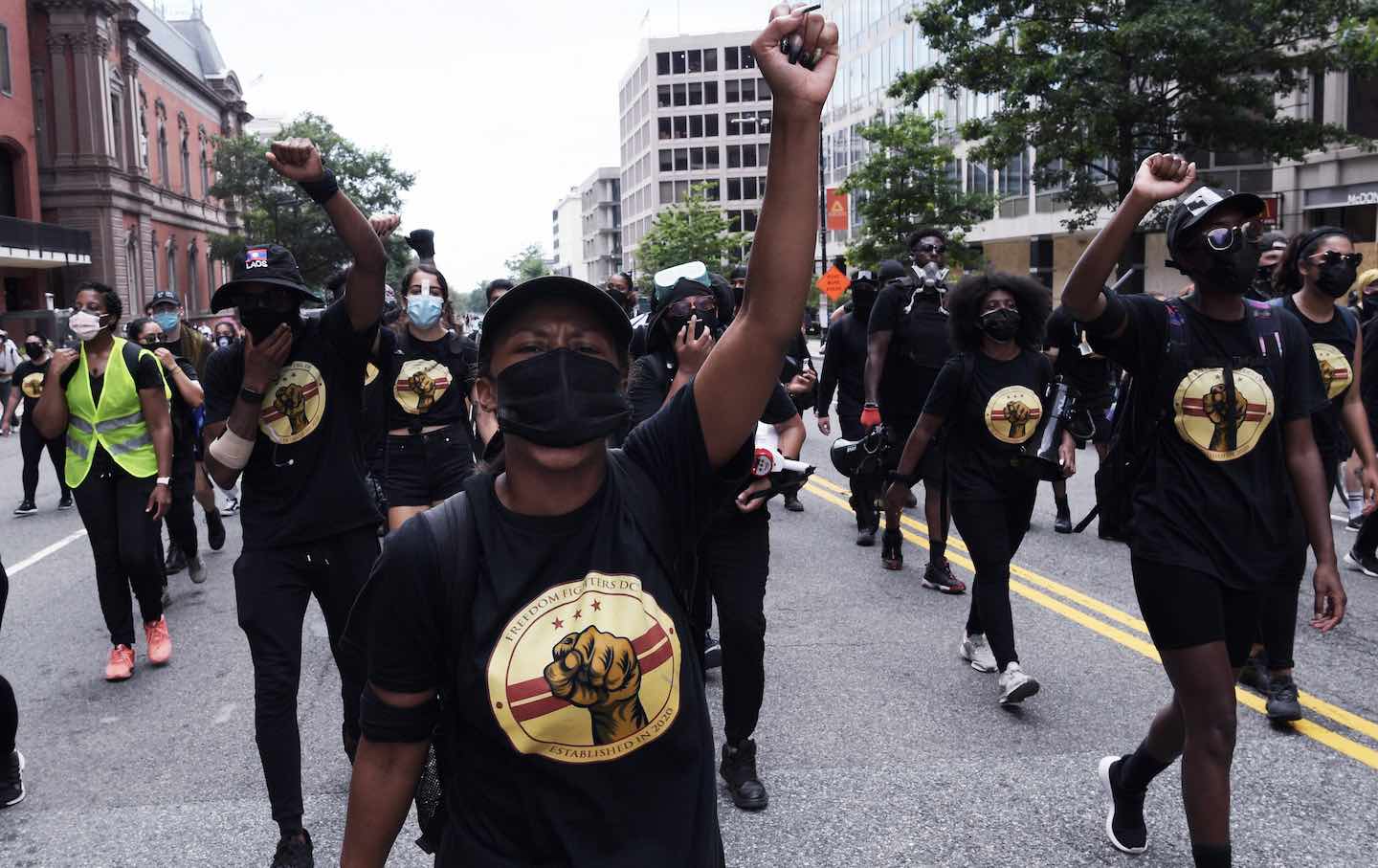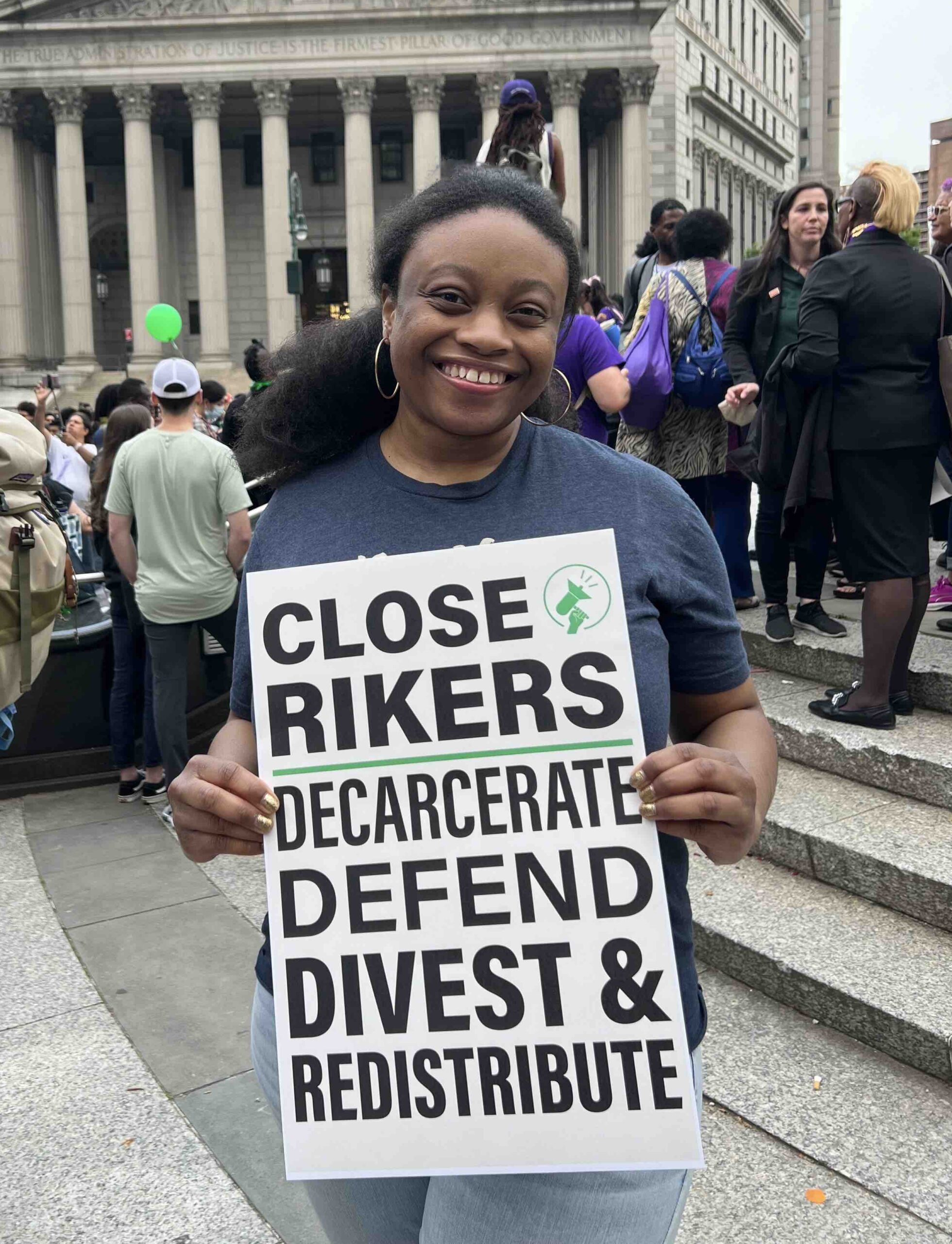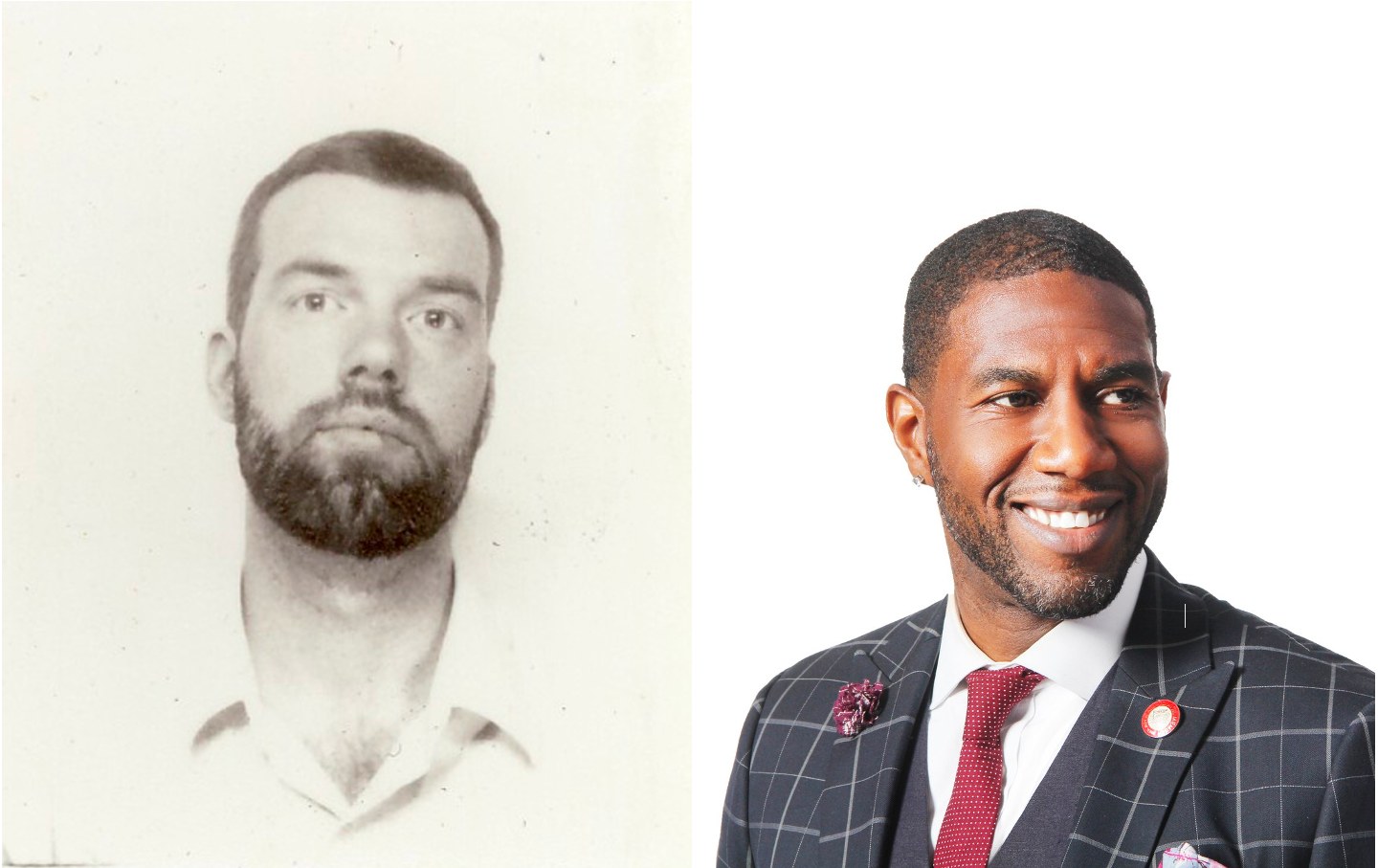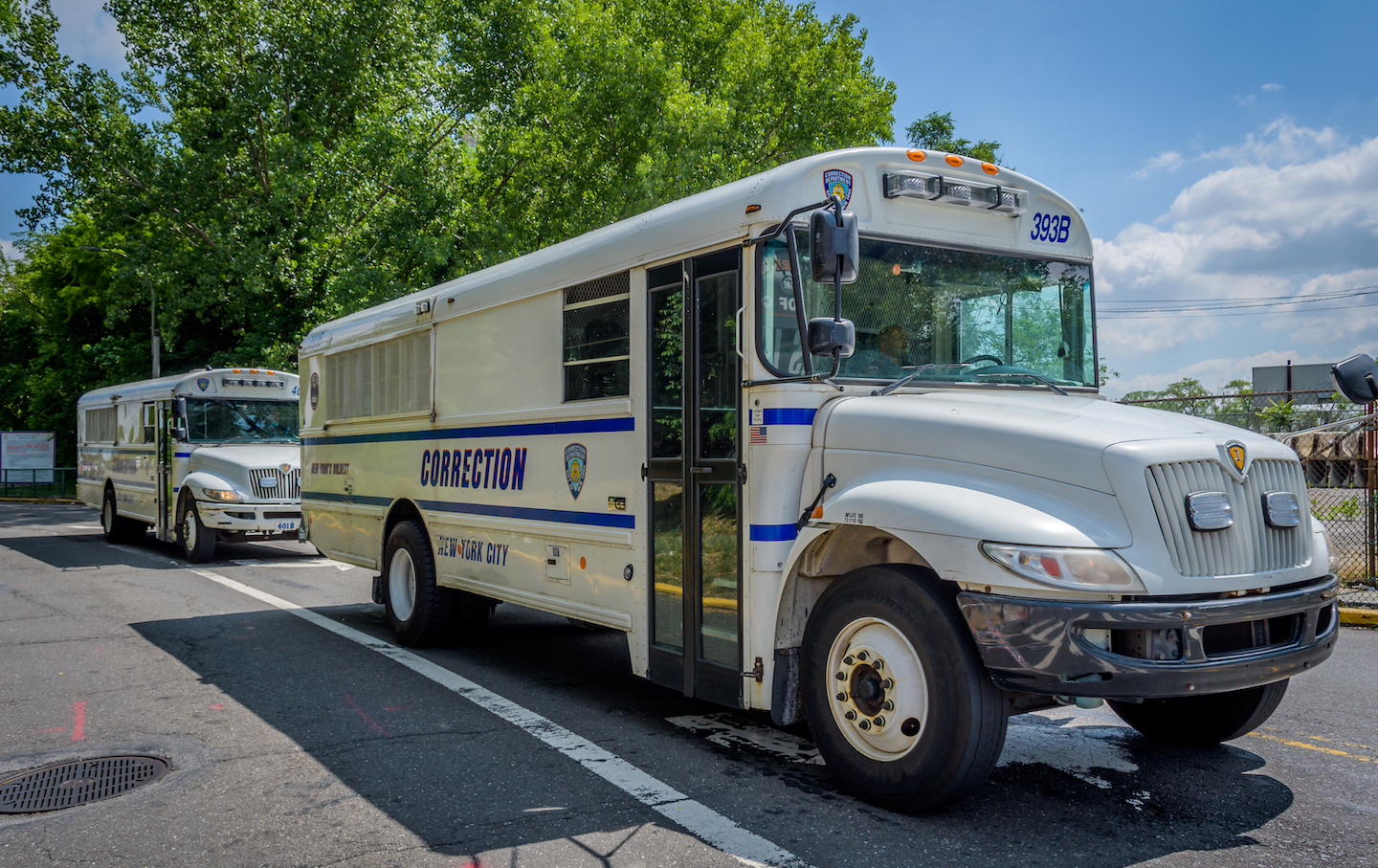We Must Celebrate Black August by Advocating to Close Rikers
To honor the legacy of the Black freedom fighters who founded Black August, join the fight to close Rikers.

Protesters from the Freedom Fighters DC movement march against police brutality on August 28, 2020, in Washington, D.C. (Photo by Lenin Nolly / NurPhoto via Getty Images)
Black August was founded in August 1979 by Black freedom fighters who were incarcerated in California’s San Quentin State Prison. These incarcerated Black freedom fighters sought to commemorate the deaths of Jonathan Jackson, George Jackson, and other Black revolutionaries. Jonathan Jackson was murdered by the police outside of Marin County Courthouse in August 1970 during his attempt to liberate three Black prisoners. Jonathan’s brother, George Jackson, was murdered by prison guards during a prison rebellion at San Quentin State Prison in August 1971.
Incarcerated Black freedom fighters identified August as a time when they would honor the lives and deaths of fellow Black freedom fighters like Jonathan and George Jackson, draw attention to inhumane prison conditions, and fight against anti-Black state-sanctioned violence. They did this by fasting from sunup to sundown, exercising daily to keep themselves physically and mentally sharp, boycotting the prison’s canteen, not consuming information from the radio or television, and studying the work of revolutionaries (with a focus on George Jackson’s work). While Black August was new, the Black resistance that inspired it was not. Incarcerated Black freedom fighters were building on the radical resistance of the Black liberation movements that came before them, including Nat Turner’s Rebellion, the Fugitive Slave Law Convention, the Haitian Revolution, the Watts Uprising, and the March on Washington—all of which occurred in August.
Black August, in turn, paved the way for the current movement to close Rikers Island, where more than half of the population is Black. The jail complex is a humanitarian violation: Incarcerated people at Rikers are subjected to overcrowding, insufficient temperature control, flooding, unhealthy food, lack of medical care and personal hygiene products, violence (including sexual assault), and solitary confinement. Rikers is an unimaginable horror, one that has stolen the lives of numerous people. In 2015, Kalief Browder, a young Black man who had been incarcerated there, committed suicide in his parents’ home because of the trauma that he experienced in the jail. Kalief had been arrested in 2010 at the age of 16 after being accused of stealing a backpack. Despite his maintaining that he did not steal the backpack, Kalief was forced to spend more than 1,100 days at Rikers awaiting trial. During that time, he was subjected to physical assault, starvation, and solitary confinement. In 2013, Kalief was released from Rikers because the charges against him had been dropped. The trial that he had been waiting three years for while incarcerated never happened. Kalief reentered society, but the trauma stayed with him.
It is crucial to understand that Kalief did not take his life; Rikers did. Rikers robbed Kalief of his life. And Kalief wasn’t the jail’s only victim. Last year, 19 people died at Rikers or local hospitals after their incarceration at the jail complex, and since the beginning of this year, eight people have died there. And there are probably more deaths that we don’t even know about, especially since Mayor Eric Adams’s administration has announced that it will no longer notify the public when an incarcerated person dies. Rikers and all the individuals who preserve the institution are the real thieves, and we cannot let their crimes against humanity continue. That’s why during Black August we must continue advocating to close the jail. Just like the Black freedom fighters who came before us, we have to resist. We have to look at the society that we are currently living in and refuse to accept it as normal. We have to radically reimagine a more liberated world—and then we have to create it.

The movement to close Rikers requires a collective effort, and there is something for everyone to do. Here are a few ways you can help:
- Hold your elected officials accountable. We vote elected officials into public office so that they can listen to the needs of our communities and create meaningful, positive, and tangible change. We need to ensure they do just that. Contact your elected officials, attend New York City Council hearings, show up at protests, and call your representatives out on social media. Ask them what their plan for closing Rikers is and demand that they be specific about it. In 2021, I helped organize the New York City Mayoral Forum on Closing Rikers Island. Candidates who were running for mayor of New York City were invited to share their plans for closing Rikers and answer questions regarding their stance on incarcerated people’s fundamental human rights. This forum was significant because voters were able to see who was serious about closing Rikers and who wasn’t. We have to make sure that elected officials don’t just state their plan to close Rikers but also follow through on it. And if they don’t? We vote them out.
- Get involved with organizations that are doing the work. Organizations such as Freedom Agenda, Legal Action Center, Women’s Community Justice Association, BronxConnect, and more are leading the Campaign to Close Rikers. This past May I joined the Campaign to Close Rikers at the Care Not Criminalization March in New York City. Advocates came together to protest Mayor Adams’s budget, which funds the police and carceral system and fails to fund essential services such as housing, education, and health care. As I stood alongside fellow advocates and held a sign that read “Close Rikers. Decarcerate, Defend, Divest, & Redistribute,” I felt hopeful. Here we were, using our voices to demand change. I felt even more optimistic knowing that this march wasn’t the last one and that advocates were going to continue taking action. If you’re looking to support the current movement to close Rikers, you can attend community meetings, volunteer with an organization, join a coalition, and donate to organizations that are truly doing advocacy work.
- Amplify the voices and stories of currently and formerly incarcerated Black people at Rikers. The system relies on our silence; that is how it perpetuates harm. So we need to make sure that incarcerated Black people’s stories are known and their voices are heard. When we do this, we are telling all those who preserve Rikers that they cannot get away with their crimes. We are telling them that we know what they did to Kalief Browder and Mary Yehudah and Dashawn Carter and countless others. We know and we will not forget.
The Black freedom fighters who founded Black August (and all of the Black freedom fighters who came before them) had unwavering strength, courage, and optimism. In the midst of their despair, they dared to dream of a more liberated world—a world where Black people have self-determination. And they didn’t just dream of that world, but they fought for it too. We must commemorate that Black resistance by working to close Rikers—once and for all.
Hold the powerful to account by supporting The Nation
The chaos and cruelty of the Trump administration reaches new lows each week.
Trump’s catastrophic “Liberation Day” has wreaked havoc on the world economy and set up yet another constitutional crisis at home. Plainclothes officers continue to abduct university students off the streets. So-called “enemy aliens” are flown abroad to a mega prison against the orders of the courts. And Signalgate promises to be the first of many incompetence scandals that expose the brutal violence at the core of the American empire.
At a time when elite universities, powerful law firms, and influential media outlets are capitulating to Trump’s intimidation, The Nation is more determined than ever before to hold the powerful to account.
In just the last month, we’ve published reporting on how Trump outsources his mass deportation agenda to other countries, exposed the administration’s appeal to obscure laws to carry out its repressive agenda, and amplified the voices of brave student activists targeted by universities.
We also continue to tell the stories of those who fight back against Trump and Musk, whether on the streets in growing protest movements, in town halls across the country, or in critical state elections—like Wisconsin’s recent state Supreme Court race—that provide a model for resisting Trumpism and prove that Musk can’t buy our democracy.
This is the journalism that matters in 2025. But we can’t do this without you. As a reader-supported publication, we rely on the support of generous donors. Please, help make our essential independent journalism possible with a donation today.
In solidarity,
The Editors
The Nation





